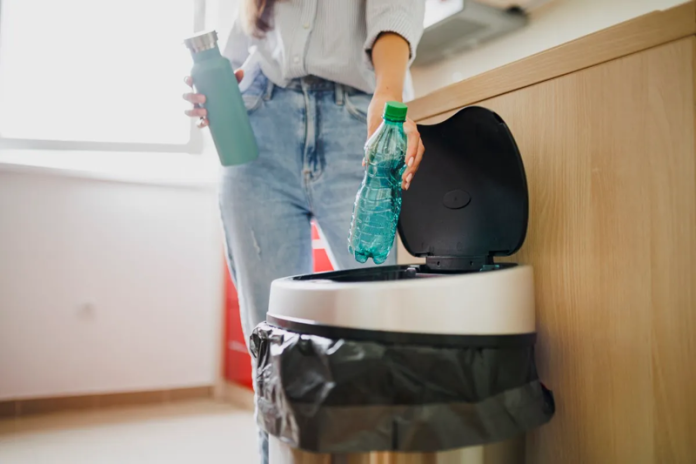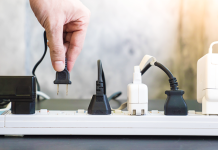Looking for the best place to store your trash in your home? It may be tempting to throw it in the living room or hide it in the basement, but these are not the most suitable locations. Maintaining your home free of garbage and other waste materials requires regular cleaning.
In this post, we will discuss why you should never store your trash in your living area, near food preparation areas, in bathrooms, in basements or attics, or close to heat sources. And we will also provide you with useful information on where to throw your trash and recycle it properly.
The 5 Places You Should Not Store Trash And Why
Many people don’t know how to properly store their trash and end up putting it in inappropriate places where it attracts pests and critters, produces unpleasant odours, poses potential health hazards or takes away from the beauty of their homes.
To avoid these issues, it’s recommended not to store your trash in these locations:
Inside the Living Areas
Storing trash directly in your living areas, such as the living room or bedroom, is strongly not recommended because it can create an unhygienic environment, leading to bad smells and attracting insects or rodents. The air quality in your home can also be compromised, which can be harmful to your health.
Near Food Preparation Areas
It’s very important to avoid storing trash near food preparation areas, such as the kitchen countertop or pantry, because doing this can contaminate your food and increase the risk of foodborne illnesses.
In Bathrooms
Storing trash in bathrooms, especially near toilets or bathtubs, is also not recommended. In humid environments such as bathrooms, waste can decompose faster and produce unpleasant odours due to accelerated decomposition. It can also breed bacteria and mould in a bathroom, compromising hygiene.
In Basements and Attics
Basements and attics are common storage areas in many households, but they shouldn’t be used to store trash. High humidity levels and temperature fluctuations can accelerate the decomposition of waste and lead to mould growth in these areas. Aside from that, if garbage is present in these areas, pests like rodents can easily enter.
Close to Heat Sources
It’s important to keep trash away from heat sources, such as radiators, fireplaces, or heaters, because heat can speed up the decomposition process, causing it to smell bad and potentially leak happening from the bags or bins.
Combustible materials in the trash can also pose a fire hazard if they come into contact with heat sources.
Why Do People Often Store Their Trash in These 5 Places?
There are several reasons why people sometimes end up storing their trash in inappropriate places despite the potential risks associated with them, such as:
- Storing trash in living areas or near food preparation areas can naturally happen out of convenience.
- Lack of awareness. Some people may not be fully aware of the potential consequences of storing trash in these improper locations.
- Limited space or storage options. In certain situations, people may have limited space or lack proper storage options for their trash. For example, in small apartments or homes with limited storage areas, they may struggle to find suitable locations for their garbage.
- Sometimes, people simply forget to dispose of their trash properly or overlook the importance of proper storage. Implementing reminders or establishing a routine for trash disposal can help with that.
- Cultural or regional practices. In some cases, cultural or regional practices may influence where people store their trash. For instance, certain communities may have traditional practices that differ from the general guidelines.
Where People Should Dispose Their Trash
To ensure proper disposal and storage of your trash, some of the recommended locations to put trash include:
- Outdoor trash bins. It’s recommended to have sturdy, sealed outdoor trash bins or containers. Outdoor bins should have tight-fitting lids to prevent pests from accessing their contents and to control their smell.
- Garbage disposal units. If your home is equipped with a garbage disposal unit, you can use it for disposing of certain food waste. Remember to follow the manufacturer’s instructions and avoid disposing of large quantities of non-biodegradable items that could damage it.
- Recycling bins. It’s highly recommended to implement a recycling system by having separate bins for recyclable materials such as paper, plastic, glass, and metal. If you do that, don’t forget to clearly label and place them in a convenient location, either indoors or outdoors, for easier sorting.
- Compost bins. Set up a compost bin or pile for organic waste, such as fruit and vegetable scraps, coffee grounds, and yard trimmings. Composting organic waste can produce nutrient-rich soil that can be used for gardening and landscaping.
- Hazardous waste collection facilities. Certain types of waste, such as batteries, electronics, paint, chemicals, and pharmaceuticals, require special ways of disposal and shouldn’t be put in the regular trash. It’s best to find local hazardous waste collection facilities or events to ensure that it’s done safely and properly.
More Tips About Proper Trash Disposal
A few additional points that people should know about proper trash disposal and storage include:
- Reduce and recycle. Consider buying products with minimal packaging, opting for reusable items, and recycling materials whenever possible. By recycling, we conserve resources, reduce landfill waste, and make the environment more sustainable.
- Segregate and sort. Proper segregation and sorting of trash are essential. Separate recyclables from non-recyclables, organic waste from general waste, and hazardous materials from regular trash.
- Be mindful of hazardous waste. Hazardous items, such as chemicals, batteries, and electronic devices, require special handling due to their potential environmental and health risks. Research local regulations and guidelines for disposing of them properly.
- Maintain cleanliness and hygiene. Regularly empty and clean your trash bins to prevent unpleasant odours from building up, use garbage bags or liners to contain waste, and consider using odour-neutralising products, such as baking soda or activated charcoal, to control the smells.
- Educate and involve others. Promote responsible behaviour among family, friends, and neighbours. Educate children about the significance of recycling and how to segregate waste properly from an early age, cultivating a sense of environmental responsibility.
Final Thoughts
Several important points should be kept in mind when storing trash.
First, never store your trash in the home; instead, find a designated garbage disposal location near your home or hire a private waste removal service.
Second, separate recyclable materials and compost organic materials when applicable.
Third, do not dispose of waste in waterways or open spaces, and fourth, use a quality trash bag or container with a lid to contain odours.
Maintaining a healthy living environment requires regular home cleaning to prevent the accumulation of trash.
By taking these steps and following the advice outlined in this blog post, you will help protect your family’s health and safety as well as the environment from potential dangers associated with improperly stored or disposed waste products.
By disposing of trash responsibly, we ensure that our planet’s beauty and resources are preserved without being exposed to hazardous materials.




